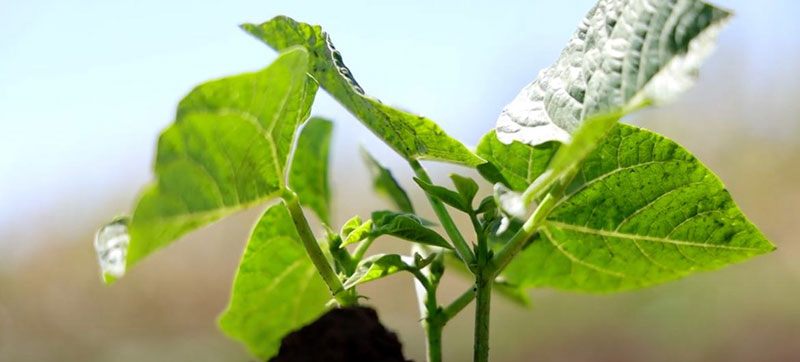 Kenya Tobacco
Kenya Tobacco
Seeds of change in Kenya as farmers lead way on tobacco-free farms
New York: In Kenya, a trailblazing sustainable agriculture project has helped hundreds of farmers move away from the harmful practice of growing tobacco, in favour of a healthier alternative, the UN said on Wednesday.
The initiative, supported by the UN Food and Agriculture Organization (FAO) and the World Health Organization (WHO), in cooperation with the Kenyan authorities, is helping to “move the needle” on ending the global tobacco epidemic, said WHO.
Easy solution
Kenya is the first country to participate in the scheme, which offers training to tobacco farmers so that they can switch to alternative crops that are easier to harvest, such as beans.
So far, growers have sold 135 tonnes of beans to the World Food Programme (WFP), delivering them significantly more income, than they earned from tobacco farming.
Growing beans has the added advantage that they are full of iron, which helps to counter numerous heath and development problems among children and pregnant women.
“The project has seen farmers’ health improve, increased school attendance from children previously working on the farms, and better crops for the environment replacing tobacco,” WHO said.
Addicted to nicotine
The UN health agency pointed out that tobacco growing accounts for less than one per cent of Kenya’s economy.
But its farmers and their families are exposed to serious health risks from the nicotine that is absorbed through the skin when handling wet tobacco leaves, exposure to heavy use of pesticides, and to tobacco dust.
“Right now, my kids have time for homework, but during tobacco farming, they did not”, said long-time tobacco grower Alice Achieng Obare, one of hundreds of farmers in Kenya’s southwestern Migori county who have moved away from tobacco.
Toxic harvest
“I would also like to tell tobacco farmers that they should come and see my chest x-ray from my doctor, my chest is full of smoke,” she said. “I can’t carry heavy stuff and I can’t walk long distances.”
Nicotine contained in tobacco is highly addictive and tobacco use is a major risk factor for cardiovascular and respiratory diseases, over 20 different types or subtypes of cancer, and many other debilitating health conditions, according to WHO.
Every year, more than eight million people die from tobacco use. Most tobacco-related deaths occur in low and middle-income countries, which are often targets of intensive tobacco industry interference and marketing.
Tobacco growing is also associated with increased gender inequality, deforestation, soil degradation and contamination of water supplies.
“Tobacco growing farmers must be given the necessary support to switch to alternative crops that have the potential to improve their health and livelihoods as well as reduce the supply of tobacco,” said Dr. Juliet Nabyonga, Acting WHO Representative to Kenya. “It’s projects like this that move the needle in the fight against the global tobacco epidemic.”
Better, all round
Another partner in the project, the Farm To Market Alliance (FtMA), explained that the sustainable food model offers smallholders the chance of a better income and food security. “WFP has provided a ready market for high iron beans, promoted good agricultural practices, nutrition sensitization, and post-harvest loss training. FtMA’s demand aggregation model has helped farmers benefit from economies of scale in input and output sales,” said Simon Cammelbeeck, FtMA Managing Director.
More than 6,000 Kenyans die of tobacco-related diseases every year; 79 men and 37 women die per week.
An estimated 220,000 children and 2.7 million adults use tobacco each day in the country. It kills more than eight million people around the world every year, and 1.2 million of these deaths are attributed to second-hand smoke exposure.
WHO has warned that nearly one in two children breathe air polluted by tobacco smoke and 65,000 youngsters die each year from illnesses related to second-hand smoke. Smoking while pregnant can lead to several life-long health conditions for babies.
Heated argument
Anyone considering trying or moving to heated tobacco products should be aware that they can expose users to “toxic emissions, many of which cause cancer and are harmful to health”, WHO has warned.
And e-cigarettes that do not contain tobacco or nicotine “are harmful to health and undoubtedly unsafe”, the UN agency has insisted, noting that it is too early to provide a clear answer on the long-term impact of heated tobacco products and e-cigarette use.
Support Our Journalism
We cannot do without you.. your contribution supports unbiased journalism
IBNS is not driven by any ism- not wokeism, not racism, not skewed secularism, not hyper right-wing or left liberal ideals, nor by any hardline religious beliefs or hyper nationalism. We want to serve you good old objective news, as they are. We do not judge or preach. We let people decide for themselves. We only try to present factual and well-sourced news.







